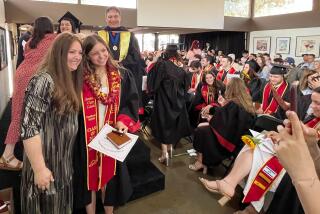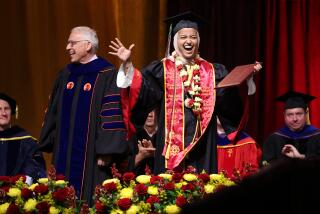Grads Must Forget Fear of Taking Risks
- Share via
Back in the early ‘70s, at the height of the Vietnam War and all the campus protests, a major university invited a battle-hardened admiral and a buttoned-down business tycoon to speak at its commencement.
I was the businessman, and both the admiral and I should have known better, because the popularity of businessmen and admirals on campus in those days ranked just a notch above mononucleosis. Those graduates were so rough on me that I stopped accepting commencement invitations for a while.
But the world seems to have come right-side-up in the past 15 years. Businessmen are welcome on campus again, sometimes even with open arms. So I’m back on the graduation circuit, giving one commencement speech a year.
It’s a big responsibility, representing one generation to another. You want to tell the graduates about the real world, but you don’t want to scare them off. You want to tell them to hang on to their basic values, but you want them to be open-minded, too. You want them to be self-confident, but not cocky. You want them to be willing to take a few sensible risks, but you don’t want them to get hurt.
A few weeks ago I spoke at Duke University. I had a simple message: I told them just to think for themselves.
That’s harder than it sounds these days. We live in an era of packaged solutions. If you’re too fat, there are a thousand books to tell you how to get thin. If you want to get rich, there are a million foolproof schemes. The problem, of course, is that store-bought solutions usually work only for the people who devised them.
So I warned the graduates: “Think for yourselves. Don’t just pick up the solutions from my generation, because our problems were a lot different.”
And they were. At every commencement I think back to my own graduation at the end of World War II. No generation ever had a brighter-looking future. The world had just been through its biggest depression followed by its biggest war, and the only country that came out of all that stronger than it went in was America. We were the king of the hill, and some of us were innocent enough to believe that we had a shot at building a perfect world.
A few things got in the way, however, like a couple more wars, eight recessions and nuclear weapons all over the place. We came up a little short on our dreams of a perfect world, but we’ve made it a little more just, a little more fair and, I think, a little more humane.
Still, I can’t help feeling a little guilty, because every generation inherits both the successes and the failures of the one that came before it. My generation is passing along a few successes, but we’re passing on a couple of big failures, too.
One is a $2-trillion national debt that is still wildly out of control. “We may be leaving you a great big mansion on a hill,” I tell them, “but there’s just one problem: We’re leaving you the mortgage, too.”
Our other failure may be worse: We don’t have a set of realistic trade policies that will help the Class of ’86 compete in the world. Instead, we’re giving them a bunch of 18th-Century economic theories that the rest of the world laughs at.
Whenever I talk to college presidents and professors, I always ask them what the students want most today. And they usually say that it’s security--a nice safe, secure, prosperous future. There’s nothing wrong with that. It’s called the American Dream, and it’s the same dream that my class had 40 years ago.
But then I ask the teachers what the big hang-ups are with kids today, and they tell me that it’s the fear of failure, of not achieving that American Dream. And fear of failure brings fear of taking risks.
I told the Duke graduates: “If that’s true, you’ve got a problem, because you’re never going to get what you want out of life without taking some risks.
“Remember, everything worthwhile carries the risk of failure. I have to take risks every day. I’d rather not, but the world doesn’t give you or me that option.
“For us, as Americans, it all started with Christopher Columbus; he risked sailing right off the end of the Earth. There must be something in the Italian genes, because seven years ago when I went to Chrysler I felt as if I were sailing right off the end of the Earth, too. And I think that I came a lot closer than Columbus did. At least I felt that way when we were losing $6 million a day every day for two full years.
“But we came through it in good shape, because we we didn’t duck the risks; we faced them. And in the end we beat them.”
I’m sure that some of the kids are a little scared, but I’m not. They’ll pick up the torch, and they’ll pass it on burning brighter than ever before. Every generation somehow manages to do that. Today’s kids are serious and determined, and they’re smart. And one more thing, which the rest of us should be awfully grateful for: They’re pretty forgiving. So I always leave feeling that maybe we really haven’t screwed things up so badly. After all, the most important thing that my generation has to leave to the world is the next generation. I think we’ve done a pretty good job on that.
More to Read
Inside the business of entertainment
The Wide Shot brings you news, analysis and insights on everything from streaming wars to production — and what it all means for the future.
You may occasionally receive promotional content from the Los Angeles Times.










